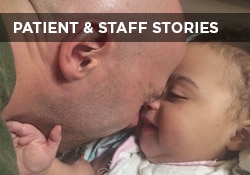This website uses cookies so that we can provide you with the best user experience possible. Cookie information is stored in your browser and performs functions such as recognising you when you return to our website and helping our team to understand which sections of the website you find most interesting and useful.

Susan E. Mazer, Ph.D. Blog
Thoughts and ideas on healthcare
Hi, and welcome to my blog! I'm Susan E. Mazer -- a knowledge expert and thought leader on how the environment of care impacts the patient experience. Topics I write about include safety, satisfaction, hospital noise, nursing, care at the bedside, and much more.
Is The Patient Experience A Goal or An Organizational Strategy?
February 2, 2018
 Members of Beryl Institute’s PX Connect Community recently shared that some patient experience directors are being asked to solve problems coming from patient complaints.
Members of Beryl Institute’s PX Connect Community recently shared that some patient experience directors are being asked to solve problems coming from patient complaints.
While I understand how this happens, I think the questions to ask are what can healthcare organizations learn from “complaints” and are they “fixing problems” or strategically improving the patient experience?
A Story
My father fell many times in the last years of his life. I was with him in his house once when he lost control of his legs, forcing him to pitch forward.
I caught him, so he did not hit his head on the glass table in front of him. But, had he done so, would the problem be that the table was in the wrong place or that he lost control over his legs?
Fixing a problem tends to use short-term solutions (moving the table), something that is immediate and relatively easy. However, preventing the problem from ever happening again requires an analysis of the problem itself (what is going on with his legs?).
Anything short of fully understanding what led up to the incident increases the chance of the problem occurring again because the root causes that led up to the event have not been identified.
Strategies vs. Goals
A strategy is a plan to bring about a desired future to ensure that whatever went wrong will not do so again. It involves systems thinking, where each step is back-tracked to see where the first challenge occurred.
It may include goals (like not falling on the table), but the picture is larger and the objective is longer term.
In other words, a strategy is the way the goal is approached and achieved, not the goal.
If healthcare professionals resolve a patient complaint by fixing a problem, they will perhaps appease that patient, but ignore the fact that other patients probably have the same issue.
The patient experience takes responsibility for all that happens to and around a patient, from the perspective of the patient. Reducing it to being “problem to solve” misses the point.
How about considering the patient experience to be a promise? A unilateral commitment to do or not do something in the immediate future — unilateral because it is not about two people having to agree.
It is about the healthcare organization itself, and each person — whether you are a nurse, physician, or other professional making a promise because you have accepted the role you are now playing.
Difference Between a Patient and a Customer
Many healthcare organizations call patients customers. However, the patient experience is not a transactional relationship.
In fact, the patient needs to do nothing for the nurse or physician to be obligated to act ethically, be kind and considerate, and respect who they are.
Customers buy things and then expect that whatever they have bought will be what it is supposed to be. However, patients get sick.
Then, they go to their physician, clinic, or hospital to get medical care. What does the physician, clinic, or hospital promise to do?
This is the crux of the patient experience initiatives in many hospitals. Healthcare professionals are developing protocols, manuals, how-to lists, and even scripts.
However, at the heart of all of this is a promise from one person to the next. The promise made by the person at the desk who greets the patient, the nurse who does the first interview, or the physician who does the examination.
So, is the patient experience a goal or an organizational strategy? Neither. It is a promise.
What does your staff promise and to whom?
P.S. If you like this post, please do me a favor and share on LinkedIn, Twitter, Facebook, etc. Also to get automatic notices when a new post is published, please subscribe. No spam – just great content. Thanks!










